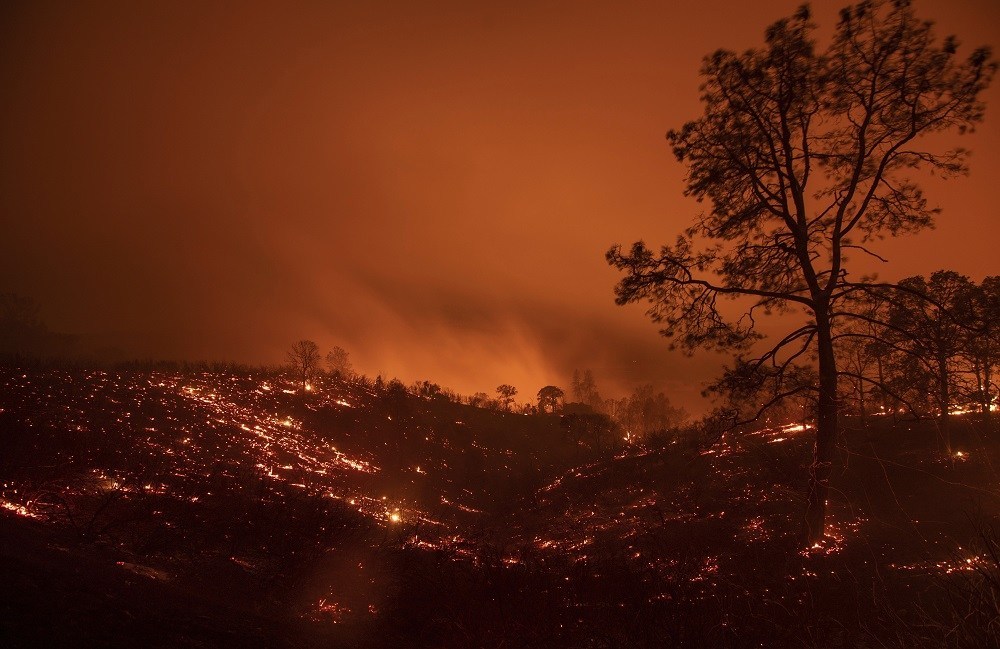
SACRAMENTO, Calif. (Courthouse News) – As the state’s largest utility pursues bankruptcy and with another wildfire season looming, California is teaming with two influential firms to protect residents and its energy grid against climate change.
In a report released Friday, advisers are pushing the Legislature and Gov. Gavin Newsom to swiftly increase wildfire prevention efforts, commit to clean energy and expand oversight of the state’s embattled utilities.
“If anyone is wondering if climate change is real, come to California,” Newsom said at a press conference Friday. “Since 2000, 15 of the top 20 most catastrophic and destructive wildfires have occurred.”
Newsom briefed the media from the state’s emergency services headquarters on a report titled “Wildfires and Climate Change: California’s Energy Future,” prepared by the firms O’Melveny and Myers and Guggenheim Securities. He called it an “outline and an educational exercise” meant to guide the state’s next moves on climate change, energy and wildfires.
The report says climate change has fueled a new “wildfire reality” for the Golden State and the 11 million residents living in fire zones. Meanwhile, regulators must clamp down on utilities that have been blamed for sparking many of the most destructive fires in the state’s recent history, according to the report.
Less than two months after the Camp Fire ripped through Butte County, Pacific Gas & Electric filed for bankruptcy in San Francisco. The utility – the nation’s largest – has warned investors it could be facing $30 billion or more in wildfire liability and has since overhauled its executive board.
Through a process called inverse condemnation, California allows private utilities like PG&E to install equipment on private property. But the law also says if their equipment contributes to a wildfire, they are held responsible for the damages – even if they aren’t found to be at fault.
The report says the law increases bankruptcy risks for utilities and that it may need to be amended to a more fault-based standard. In doing so, the risk of property losses would move from utilities to insurance companies “in cases where the utility was not a bad actor.”
“Bottom line – utilities in or on the verge of bankruptcy are not good for Californians, for economic growth or for the state’s future,” the report states.
Newsom, a Democrat, wouldn’t say whether the state should scrap inverse condemnation. But he noted it will likely be the courts that change the longstanding law, not the Legislature.
Other ideas to spread the cost of wildfire liability include creating a fund that utilities can access to pay wildfire claims while investigators are still determining the cause of a fire, and a separate “catastrophic wildfire” fund that would spare ratepayers from rate hikes often passed on by utilities after disasters.
Newsom challenged lawmakers to study the report and send him solutions within 90 days. He also promised any fixes he approves won’t go easy on PG&E.
“I expect the investors that are involved in PG&E to participate in the solutions and I expect that PG&E is going to get serious and no longer misdirect, manipulate and mislead the people of this state,” Newsom said.
State Sen. Bill Dodd, a Democrat whose district was ravaged by the Wine Country fires in 2017, says Newsom has been “laser-focused” on making California more fire resilient.
“The bottom line is that given the threat of climate change and catastrophic wildfires, we need to take bold steps to protect the public and ensure affordable, reliable energy delivery,” Dodd said in a statement. “I have been working closely with his office and look forward to partnering to refine and pass a package of reforms to protect the state in this new normal.”
Along with ramping up forest thinning and spreading the cost of wildfires, the report recommends changes at the California Public Utilities Commission. The advisers, or what Newsom has called his “strike force,” want the commission to be “more nimble” and get more involved in rate-setting and utility audits.
Citing an “unstable energy market,” the strike force also called for California to continue moving away from fossil fuels and force utilities to further embrace clean energy.
“A modern transmission and distribution system will create high-quality jobs and long-term economic stability, in addition to making us more resilient to the impacts of climate change and protecting the millions of residents living in fire-prone areas,” the report states.
Newsom says California will no longer be “passive” with its emergency preparedness in the era of climate change.
“We’re in a very precarious state, literally and figuratively, and it requires us to adapt and requires us to be nimble,” Newsom said.
Leave a Reply